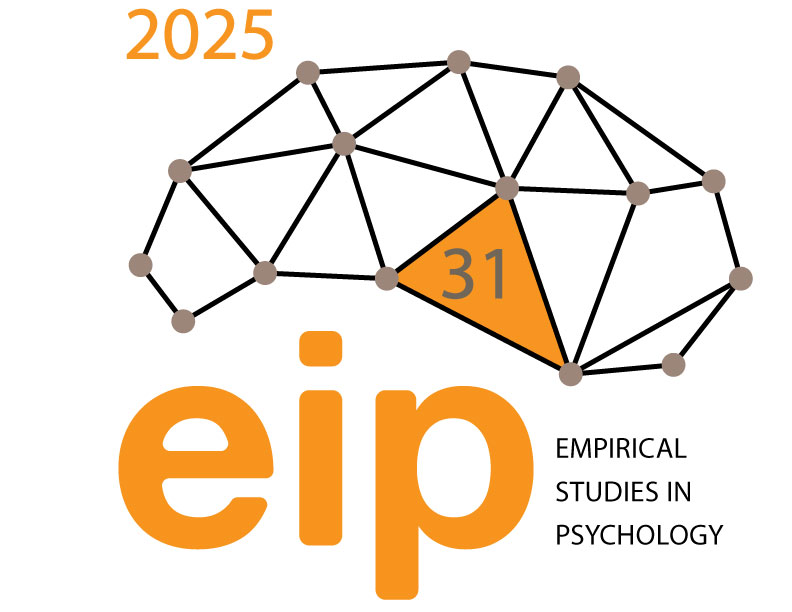Conference proceedings – Instructions for authors
Conference proceedings will be available online on this link. Authors that wish to submit proceedings should apply via the questionnaire that will be published on the website, conference Facebook page and will be sent via e-mail to the authors. Please submit your papers by the date in the notice of application for proceedings. Papers are submitted by sending them to the email eip@f.bg.ac.rs, with the subject “proceedings_submission_[first_author_surname]”
- Paper length should be between 6000 and 8000 characters with spaces (excluding abstract, title, authors’ names,
affiliations and keywords). Papers should be written in English. - Please use Microsoft Word text processor, please download template for EIP proceedings: TEMPLATE EIP PROCEEDINGS.
- Papers that do not follow the template, will not be sent for a review
- Paper should contain the following (in accordance withttp://empirijskaistrazivanja.org/wp-content/uploads/2025/05/EIP_template_2025.docxh the APA7 standards):
- Shorter abstract (from 1000 to 1400 characters with spacing) – abstract for the conference proceedings should not be the same as the one submitted for the conference. In addition, it should not contain statistics. Unless statistical technique is a topic of the paper, used statistical techniques should not be mentioned in the abstract.
- Up to 5 keywords
- Short introduction and clearly stated problem and the aim of the study
- Method
- Results
- Discussion and conclusions
- Reference list
- When displaying statistics, it is necessary to clearly display values, degrees of freedom, and level of significance (e.g., t(121) = 15.34, p<.05).
- Tables should be prepared in Word or another editable format. Tables and figures should be copied from statistics software and prepared for Word and adjust for the current paper (figures should be high-resolution, at least 300 dpi). The same data should not be displayed in both text and in tables/figures. Each table, figure, and/or picture should be numbered and with adequate title placed above the table, figure, or picture. Authors should refer to each table, graph or picture in the text.
- Paper should be written according to APA7 standards.
You can download:
Instructions for formating statistical parameters
Additional Guidelines for Writing Papers Based on Qualitative Methodology
In accordance with the APA reporting standards from 2018 (Levitt et al., 2018), when writing scientific papers using qualitative methodology, it is particularly important to consider the following elements:
Contextualization, Clarity, and Thoroughness
- It is important to describe the context of research, phenomenon and the participants (location, time, social dynamics).
- The research paradigm and approach (e.g., interpretative, critical, feminist, phenomenological, socio-constructivist) should be explicitly stated and justified, along with the choice of the overall research design.
- Qualitative research does not rely on variables or hypotheses. However, it is important to clearly outline the research topic, aims, research questions, and even motivation for the study.
- Basic characteristics of participants, documents, or analyzed events, as well as the ways and reasons for selecting (or excluding) specific participants, documents, events, or any other materials, should be provided.
- Authors should define the type of analysis (e.g., thematic, interpretative phenomenological, case study, narrative, discursive), units of analysis (e.g., sentence, document, photograph), and approach to data analysis (deductive, inductive, combined).
- The presentation of results should go beyond mere description or paraphrasing of participants’ words and include a deeper interpretation of data, attempting abstraction and generalization.
- Quantification (e.g., number of coded segments within a specific theme) and/or schematization (e.g., thematic maps) of individual data may be used to improve the clarity of results and summarize them (given the limitations in the number of characters), but are not required.
- If applicable, it is desirable to describe the theoretical and practical contributions and implications of the research.
Credibility
- Transparency and detail in describing methods are crucial. Authors should justify decisions made during data collection or analysis.
- If the method allows, presenting participants’ statements or excerpts from documents/materials that vividly illustrate the analyzed phenomenon is recommended.
- Authors should explain how they sought to ensure the credibility of the research (e.g., triangulation, coding with a colleague, calculating inter-coder agreement, member check) and clearly indicate the limitations of the study, recommendations for further research, and any ethical issues/dilemmas.
Terminology and Writing Style
- Combining results with discussion in a single section (often labeled as Findings instead of Results) is acceptable.
- Different terminology may be used in the methodology section compared to quantitative research, referring to participants instead of sample or data generation/ data collection strategies instead of research instruments.
- Writing in the first person singular is acceptable, and authors should clearly position themselves in relation to the research topic and context, reflecting on how the researcher’s position influenced the research process and interpretation of results.
When presenting mixed methods research, it is necessary to justify the choice of this method and describe how the data complement each other. Ensuring coherence regarding the research approach, analysis, and interpretation of results is particularly important in mixed methods research.
